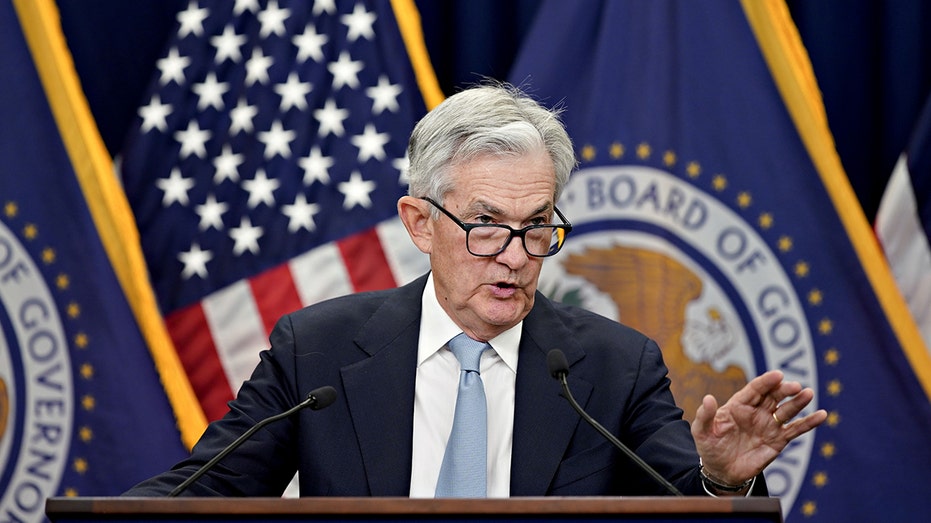Powell says Fed won't rush to cut interest rates until inflation is conquered
Fed's Powell doubles down on 'no rush to cut' message in congressional testimony
WATCH LIVE: Fed Chair Powell testifies before House panel on state of the US economy
Investors are watching for any clarity about the timing of interest-rate cuts this year.
Federal Reserve Chair Jerome Powell on Wednesday said policymakers are on track to cut interest rates sometime in 2024, but are not ready to do so until they are confident inflation is tamed.
"The committee does not expect that it will be appropriate to reduce the target range until it has gained greater confidence that inflation is moving sustainably toward 2%," he said in remarks prepared for testimony before the House Financial Services Committee.
The Fed chief is on Capitol Hill for the first of two days of his semi-annual monetary policy testimony. He is slated to appear before the Senate Banking Committee on Thursday.
FED HOLDS INTEREST RATES STEADY, SIGNALS IT IS NOT READY TO START REDUCING RATES

Federal Reserve Chairman Jerome Powell speaks during a news conference in Washington, D.C., on March 22, 2023. (Al Drago/Bloomberg via / Getty Images)
Powell's remarks come amid some concern on Wall Street that progress on inflation is stalling out. While inflation has fallen considerably from a peak of 9.1%, progress has largely flatlined since the summer.
Policymakers have raised interest rates sharply over the past two years, approving 11 rate increases in the hopes of crushing inflation and cooling the economy. In the span of just 16 months, interest rates surged from near zero to above 5%, the fastest pace of tightening since the 1980s.
Fed officials are now grappling with when they should take their foot off the brake. Powell said officials are trying to balance the risks between cutting interest rates too soon, which risks setting off inflation again, or waiting too long to cut rates, which could weigh on the economy and possibly trigger a recession.
"We believe that our policy rate is likely at its peak for this tightening cycle," he said. "If the economy evolves broadly as expected, it will likely be appropriate to begin dialing back policy restraint at some point this year. But the economic outlook is uncertain, and ongoing progress toward our 2% inflation objective is not assured."
FED'S FIGHT AGAINST INFLATION IS WEIGHING ON MIDDLE-CLASS AMERICANS
The Federal Open Market Committee voted during its January meeting to hold rates steady at a range of 5.25% to 5.5%, the highest level in 22 years. Although officials also cracked open the door to reducing rates this year, Powell has repeatedly pushed back against expectations for imminent cuts.
Officials will hold their next meeting on March 19-20, where they are widely expected to hold rates steady for the fifth straight time.
ECONOMISTS PREDICT MUCH STRONGER GROWTH IN 2024. HERE'S WHY
Most investors now expect the Fed to begin cutting rates in June and are penciling in three to four reductions this year — a dramatic shift from the start of the year, when they anticipated six rate cuts beginning as soon as March.
Hiking interest rates tends to create higher rates on consumer and business loans, which then slows the economy by forcing employers to cut back on spending. Higher rates have helped push the average rate on 30-year mortgages above 8% for the first time in decades. Borrowing costs for everything from home equity lines of credit, auto loans and credit cards have also spiked.
| Ticker | Security | Last | Change | Change % |
|---|---|---|---|---|
| I:DJI | DOW JONES AVERAGES | 49395.16 | -267.50 | -0.54% |
| I:COMP | NASDAQ COMPOSITE INDEX | 22682.729157 | -70.91 | -0.31% |
| SP500 | S&P 500 | 6861.89 | -19.42 | -0.28% |
GET FOX BUSINESS ON THE GO BY CLICKING HERE
Yet the rapid rise in rates has not stopped consumers from spending or businesses from hiring.
The labor market is continuing to chug along at a healthy pace, with employers adding 353,000 new workers in January — nearly double what economists expected. Job openings remain high, and the unemployment rate is continuing to hover around 3.7%.
Fed officials have said higher interest rates are still working their way through the economy and will eventually weigh on growth. Until that happens, policymakers have indicated they will keep interest rates elevated.





















